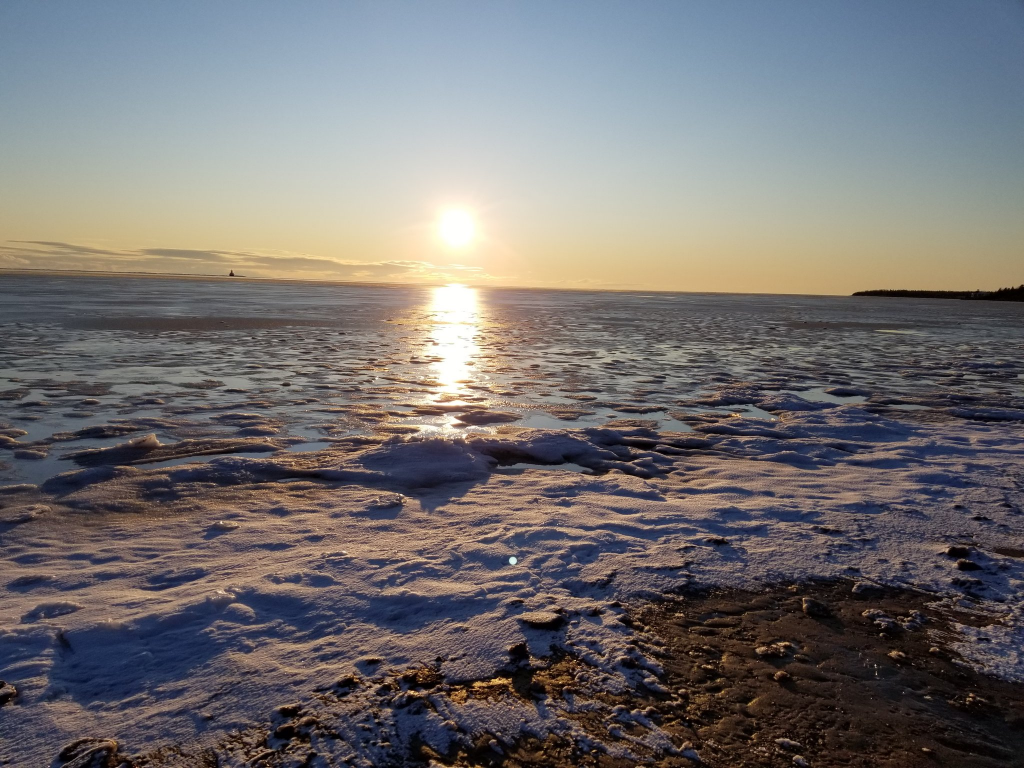A Walk on the Edge 2020 | Megan Lane MacDonald
On the Edge
Megan Lane MacDonald

When I visited the Summerside boardwalk in early January, I had to jump from the last step to reach the beach below. The bottom part of the stair must have been removed at the end of the summer. This is probably to deter people from going down to the water in the winter. I remarked to myself that it was strange to have such a barrier between pedestrians and the shore, while in the summer the beach would be full of people. Why shut us all in by blocking off the beach? The thought made me feel almost claustrophobic. The beaches surrounding the Island often feel more like bridges than barriers, connecting the land to the deeper ocean that lay beyond the horizon, but the thought of blocking off the beach in this way felt like putting a wall up around the Island. Closing us in like the ice creeping in the harbour and preventing escape. These cold snowy months already cause enough cabin fever as it is. Visiting the water usually helps to open up the boundaries of my mind and imagine the larger world around me but this visit did not inspire the same kind of energy as previous summertime visits.
I did not feel the usual sense of homecoming and connection that I get from staring out at the sea. I could not really even see the sea, just an endless expanse of white trailing off somewhere to grey. It was hard to tell where the ice stopped and the unfrozen water began, it was all one gradient. The water, when in this state of churning half-ice, is not impassable but uninviting. It is unwelcoming to sailboats or ferries and unfit for the iceboats of old. The water felt like more of a barrier than ever. An unmovable wall between us and the world. The water barred me from what lay over the horizon, and the ice enclosed the waters. The usual blending of sea and sky was removed. The ice divided up the elements with hard lines. There was a feeling of loneliness to the quiet but it was not a sad loneliness. It was more of a patient waiting. An expectation of the eventual return of activity. No fishing boats crawled across the horizon that day. No beachcombers roamed along the shore, pressing countless footsteps into the sand. The sand lay untouched, hidden beneath blankets of snow and a hard shell of ice.
Even the sea was quiet. The same sea which usually bashes against our sandstone, chipping away at the Island’s borders, shrinking it, eating up the cliffs and devouring the dunes. Its usual steady breaths, inhaling and exhaling its waves onto the shore, were gone. The sound of my own footsteps crunching through the layers of snow echoed in my ears. I was unused to the silence. I have never before been to the beach and been unable to hear the waves crashing onto the beach, seagulls screaming in the wind, or laughter in the dunes. It felt as if the land and sea were collectively holding their breath. I kept quiet myself, feeling it inappropriate to break the restful silence. Nothing sang, nothing moved, not even myself. There was a pervasive stillness that seeped into my skin through the cold wind until I stood at a standstill looking out over the ice.
It was not altogether unpleasant. There was a serenity to the stillness; a restfulness. I might have stood there forever if I hadn’t been so cold. My body shook with wave after wave of shivers, providing the movement that the landscape lacked. Since the sand was hidden away by the snow, I couldn’t stoop to feel the sand slip through my fingers as I normally would at the beach. I couldn’t climb the massive piles of red sandstone. I couldn’t hunt for seashells, snails, or crabs, yet I still meticulously scanned my surroundings as if I were habitually searching for points of interest. The whole beach was devoid of life and colour. Any intricacies were hidden beneath an all-encompassing layer of plain white.
The harbour was not the shape I had seen last summer. It astonishes me how much a place can change over the course of a year, or even just from one season to the next, and yet still return to old familiarity once again. Standing on the icy shore, the Island felt larger than it ever had. It was difficult to tell where the ice stopped and the water began. The layers of ice grown around the coast had moved the border between land and sea farther out into the water’s territory, claiming it as its own. The ice caged me in so that leaving the Island felt impossible, and for that my world shrunk. But that world was still somehow bigger than before. The entire shore had expanded. It was as if the Island had stretched itself out before it settled into its winter nap. The entire beach had fallen asleep. Those still waves were now a frozen ring encircling the shores. Silent. Hushed by the breath of winter.